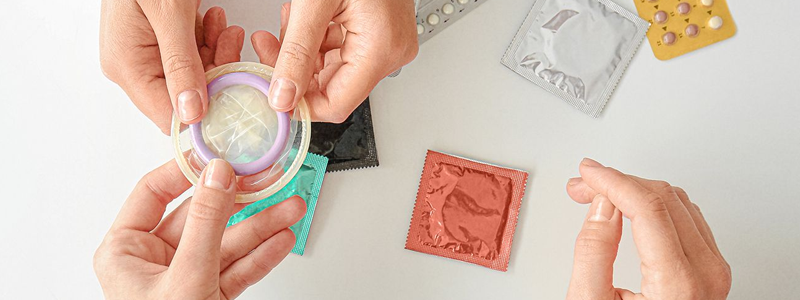
Contraception, also known as birth control or family planning, refers to the methods and practices used to prevent unwanted pregnancies. It allows individuals and couples to make informed choices about when and if they want to have children. There are various contraceptive methods available, each with its own effectiveness, benefits, and considerations.
Barrier Methods:Barrier methods create a physical barrier between the sperm and the egg, preventing fertilization. Examples include:
- Male condoms:- These sheaths made of latex or polyurethane are worn over the penis to prevent sperm from entering the vagina.
- Female condoms:- These pouch-like devices are inserted into the vagina prior to intercourse and provide a barrier to sperm.
- Diaphragms and cervical caps:- These are soft, dome-shaped devices that are inserted into the vagina to cover the cervix, blocking sperm from entering.
Hormonal Methods:- Hormonal methods use synthetic hormones to prevent ovulation, thicken cervical mucus, and thin the lining of the uterus, making it less receptive to fertilization. Examples include:
- Combined oral contraceptives (the Pill): These contain both estrogen and progestin and are taken daily.
- Progestin-only pills (mini-pills): These contain only progestin and need to be taken at the same time every day.
- Contraceptive patch: A small patch containing hormones is applied to the skin and replaced weekly.
- Contraceptive injection: A progestin injection is administered every three months.
- Contraceptive implant: A small rod containing progestin is inserted under the skin of the arm and provides protection for several years.
- Hormonal intrauterine devices (IUDs): These devices are placed inside the uterus and release hormones to prevent pregnancy.
Intrauterine Devices (IUDs):-Non-hormonal IUDs, such as the copper IUD, work by creating an environment in the uterus that is toxic to sperm, preventing fertilization. They can provide long-term contraception for several years.
Emergency Contraception:-Also known as the "morning-after pill," emergency contraception is a backup method used after unprotected sex or contraceptive failure to prevent pregnancy. It contains high doses of hormones that can inhibit ovulation or fertilization if taken within a specific time frame.
Sterilization:- Sterilization procedures are considered permanent methods of contraception. They involve surgically blocking or sealing the fallopian tubes in women (tubal ligation) or vasectomy in men (cutting or sealing the vas deferens).
Natural Methods:- Natural methods of contraception involve tracking fertility signs and abstaining from intercourse during the fertile window. These methods include fertility awareness-based methods (tracking menstrual cycles, basal body temperature, and cervical mucus) and withdrawal (removal of the penis before ejaculation).
It's important to note that no contraceptive method is 100% effective, and the choice of method depends on individual circumstances, preferences, and health considerations. Consulting with a healthcare professional is essential to determine the most suitable method and ensure proper usage.
Besides preventing pregnancy, some forms of contraception, such as hormonal methods, can also provide other benefits, including regulation of menstrual cycles, reduced menstrual pain, and improvement of acne symptoms.
It is crucial to remember that contraception does not protect against sexually transmitted infections (STIs). For protection against STIs, the use of condoms is recommended in addition to other contraceptive methods.
